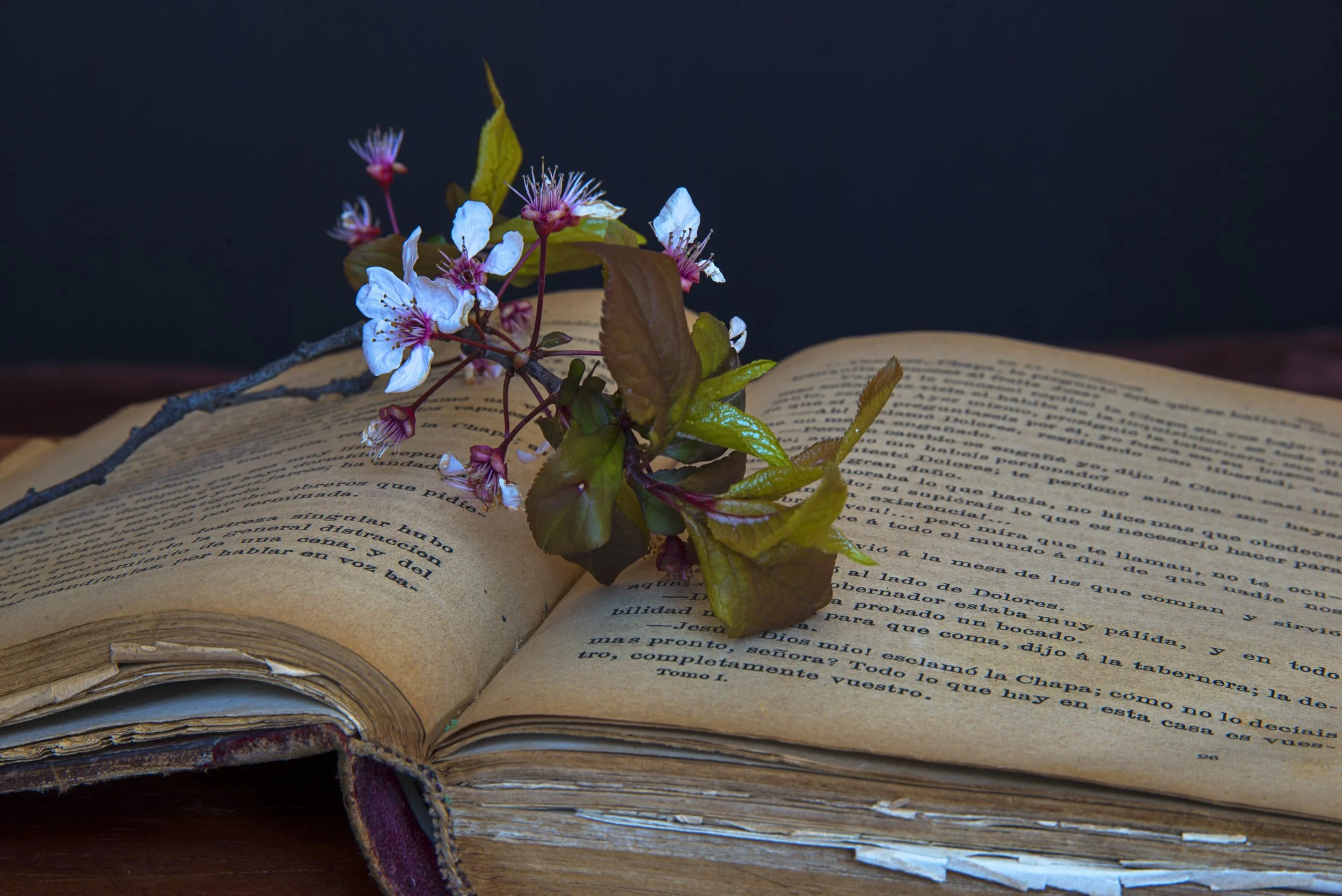7 Must-Read Poets for National Poetry Month
April is the month of glorious spring sunshine and new beginnings. How appropriate that it is also National Poetry Month.
National Poetry Month was established by the Academy of American Poets in 1996, and has since become the largest celebration honoring poets and poetry in the world. To add our voice to the festivity, here are 7 wonderful poets to read this April.
1. Emily Dickinson
Emily Dickinson may have led a reclusive life, but great passion, insight, and depth of feeling were brewing in her isolation.
The majority of her poems were not discovered until after her death, but thankfully they were published and we can continue to enjoy them today.
Part I: Life: VI
If I can stop one heart from breaking
I shall not live in vain;
If I can ease one life the aching,
Or cool one pain,
Or help one fainting robin
Unto his nest again,
I shall not live in vain
2. Adrienne Rich
Perhaps best known for her collection, “The Dream of a Common Language,” Adrienne Rich was an influential and widely read intellectual, poet, and essayist. Her work reflects the values she deeply cared about by exploring issues of feminism, politics and sexuality.
Twenty-One Love Poems: III
Since we’re not young, weeks have to do time
for years of missing each other. Yet only this odd warp
in time tells me we’re not young.
Did I ever walk the morning streets at twenty,
my limbs streaming with a purer joy?
did I lean from any window over the city
listening for the future
as I listen here with nerves tuned for your ring?
And you, you move toward me with the same tempo.
Your eyes are everlasting, the green spark
of the blue-eyed grass of early summer,
the green-blue wild cress washed by the spring.
At twenty, yes: we thought we’d live forever.
At forty-five, I want to know even our limits.
I touch you knowing we weren’t born tomorrow,
and somehow, each of us will help the other live,
and somewhere, each of us must help the other die.
3. Leonard Cohen
Leonard Cohen was brought back into the public eye after his death in November, 2016. Widely known as a singer-songwriter, Cohen was also a riveting poet, masterfully painting the vignettes of life with articulate depth and a masterful hand.
Untitled
(From “Book of Longing)
You don’t want to go out anymore
It’s bearable alone
Just you and the bad news
And the confession of Mother Theresa
G-d bless her for letting us know
That she couldn’t take it either
4. Dorothy Allison
Author of the bestselling novel, “Bastard out of Carolina,” Dorothy Allison is a southern writer who brings all of the influence of her South Carolina upbringing to her writing. A survivor of horrific childhood abuse, Allison’s writing explores rage, lust, sexuality, violence, and family dysfunction. Her collection of poetry, “The Women Who Hate Me,” is a raw account of seeking healing and relief from rage through sexuality.
The Women Who Love Me
She could not sleep.
I could not stay awake.
She hinted that if I did not
I might wake up on the fire escape,
naked, on the roof or sidewalk.
I nodded, nodded, nodded out.
The women who love me
hold me when I sleep,
put their legs between mine.
Their fingers lace my cold ears.
They breathe on me, careful
not to wake me too soon.
The women who love me have
their own sisters to reconcile,
brothers, family and Broadway winds.
The women whose hands never touch my own
still reach me turning round
to face their fear laughing
at a hatred never meant to be understood.
They bank on the ground I stand on
every time they stand against the wind
refuse to deny themselves, their people,
bend but do not fall,
hold to time
and steady struggle,
the reach of daylight,
the hope of women who love each other,
women who truly love each other.
5. Pablo Neruda
Pablo Neruda was a pseudonym for Ricardo Eliecer Neftalí Reyes Basoalto, one of the greatest Latin American poets in history. At the age of 19, Neruda sold all his of his possessions in order to finance the publication of his first work of poetry. His second collection of poetry, “Twenty Love Poems and a Song of Despair,” launched Neruda in to celebrity at the tender age of 20.
Love Sonnet XVII
I don’t love you as if you were a rose of salt, topaz,
or arrow of carnations that propagate fire:
I love you as one loves certain obscure things,
secretly, between the shadow and the soul.
I love you as the plant that doesn’t bloom but carries
the light of those flowers, hidden, within itself,
and thanks to your love the tight aroma that arose
from the earth lives dimly in my body.
I love you without knowing how, or when, or from where,
I love you directly without problems or pride:
I love you like this because I don’t know any other way to love,
except in this form in which I am not nor are you,
so close that your hand upon my chest is mine,
so close that your eyes close with my dreams.
6. Dorothy Parker
Owning a legendary wit, Dorothy Parker began her career on the editorial team of Vogue and later replaced P.G. Wodehouse as the drama critic for Vanity Fair. Her first collection of poetry, “Enough Rope” was a bestseller after being published in 1926. In spite of her success, Parker struggled with depression and alcohol abuse. She passed away from a heart attack in June of 1967.
Bohemia
Authors and actors and artists and such
Never know nothing, and never know much.
Sculptors and singers and those of their kidney
Tell their affairs from Seattle to Sydney.
Playwrights and poets and such horses' necks
Start off from anywhere, end up at sex.
Diarists, critics, and similar roe
Never say nothing, and never say no.
People Who Do Things exceed my endurance;
God, for a man that solicits insurance!
7. Charles Bukowski
All grit and guts, the poetry of Charles Bukowski takes no prisoners. A notorious womanizer and alcoholic, Bukowski was not afraid of brutal honesty, even if that meant throwing himself under the bus. His unabashed references to alcohol abuse and violent and sexual imagery make him polarizing among readers. You may be relieved or offended by his honesty, but your eyes will not leave the page without having glimpsed the raw and unfiltered truth of living.
Let it Enfold You
either peace or happiness,
let it enfold you
when i was a young man
I felt these things were
dumb, unsophisticated.
I had bad blood, a twisted
mind, a precarious
upbringing.
I was hard as granite, I
leered at the
sun.
I trusted no man and
especially no
woman.
I was living a hell in
small rooms, I broke
things, smashed things,
walked through glass,
cursed.
I challenged everything,
was continually being
evicted, jailed, in and
out of fights, in and out
of my mind.
women were something
to screw and rail
at, i had no male
friends,
I changed jobs and
cities, I hated holidays,
babies, history,
newspapers, museums,
grandmothers,
marriage, movies,
spiders, garbage men,
english accents, spain,
france, italy, walnuts and
the color
orange.
algebra angered me,
opera sickened me,
charlie chaplin was a
fake
and flowers were for
pansies.
peace and happiness to me
were signs of
inferiority,
tenants of the weak
and
addled
mind.
but as I went on with
my alley fights,
my suicidal years,
my passage through
any number of
women-it gradually
began to occur to
me
that I wasn't different
from the
others, I was the same,
they were all fulsome
with hatred,
glossed over with petty
grievances,
the men I fought in
alleys had hearts of stone.
everybody was nudging,
inching, cheating for
some insignificant
advantage,
the lie was the
weapon and the
plot was
empty,
darkness was the
dictator.
cautiously, I allowed
myself to feel good
at times.
I found moments of
peace in cheap
rooms
just staring at the
knobs of some
dresser
or listening to the
rain in the
dark.
the less i needed
the better i
felt.
maybe the other life had worn me
down.
I no longer found
glamour
in topping somebody
in conversation.
or in mounting the
body of some poor
drunken female
whose life had
slipped away into
sorrow.
I could never accept
life as it was,
i could never gobble
down all its
poisons
but there were parts,
tenuous magic parts
open for the
asking.
I re-formulated
I don't know when,
date, time, all
that
but the change
occurred.
something in me
relaxed, smoothed
out.
i no longer had to
prove that i was a
man,
I did'nt have to prove
anything.
I began to see things:
coffee cups lined up
behind a counter in a
cafe.
or a dog walking along
a sidewalk.
or the way the mouse
on my dresser top
stopped there
with its body,
its ears,
its nose,
it was fixed,
a bit of life
caught within itself
and its eyes looked
at me
and they were
beautiful.
then- it was
gone.
I began to feel good,
I began to feel good
in the worst situations
and there were plenty
of those.
like say, the boss
behind his desk,
he is going to have
to fire me.
I've missed too many
days.
he is dressed in a
suit, necktie, glasses,
he says, "i am going
to have to let you go"
"it's all right" i tell
him.
He must do what he
must do, he has a
wife, a house, children.
expenses, most probably
a girlfriend.
I am sorry for him
he is caught.
I walk onto the blazing
sunshine.
the whole day is
mine
temporarily,
anyhow.
(the whole world is at the
throat of the world,
everybody feels angry,
short-changed, cheated,
everybody is despondent,
disillusioned)
I welcomed shots of
peace, tattered shards of
happiness.
I embraced that stuff
like the hottest number,
like high heels, breasts,
singing, the
works.
(dont get me wrong,
there is such a thing as cockeyed optimism
that overlooks all
basic problems just for
the sake of
itself-
this is a shield and a
sickness.)
The knife got near my
throat again,
I almost turned on the
gas
again
but when the good
moments arrived
again
I didn’t fight them off
like an alley
adversary.
I let them take me,
i luxuriated in them,
I bade them welcome
home.
I even looked into
the mirror
once having thought
myself to be
ugly,
I now liked what
I saw, almost
handsome, yes,
a bit ripped and
ragged,
scares, lumps,
odd turns,
but all in all,
not too bad,
almost handsome,
better at least than
some of those movie
star faces
like the cheeks of
a babies
butt.
and finally I discovered
real feelings for
others,
unheralded,
like lately,
like this morning,
as I was leaving,
for the track,
i saw my wife in bed,
just the
shape of
her head there
(not forgetting
centuries of the living
and the dead and
the dying,
the pyramids,
Mozart dead
but his music still
there in the
room, weeds growing,
the earth turning,
the tote board waiting for
me)
I saw the shape of my
wife's head,
she so still,
i ached for her life,
just being there
under the
covers.
i kissed her in the,
forehead,
got down the stairway,
got outside,
got into my marvelous
car,
fixed the seatbelt,
backed out the
drive.
feeling warm to
the fingertips,
down to my
foot on the gas
pedal,
I entered the world
once
more,
drove down the
hill
past the houses
full and empty
of
people,
i saw the mailman,
honked,
he waved
back
at me.










